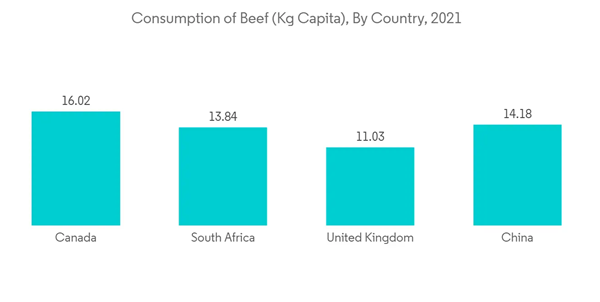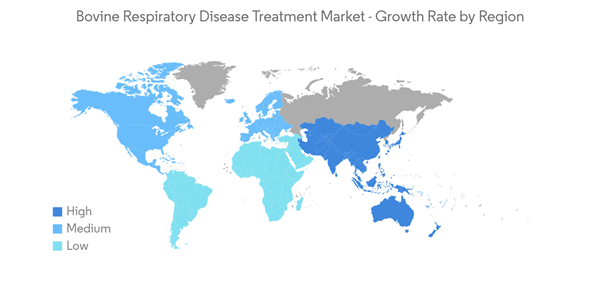The COVID-19 pandemic disrupted animal health care during the initial stages of the pandemic. The strict lockdown imposition of lockdown affected the accessibility to veterinary clinics, thus impacting the market's growth over the pandemic phase. According to the study published in the Indian Journal of Animal Science in June 2022, there was a significant difference in the number of cases attended across different lockdown periods and among veterinarians, with a decline in the number of cases attended across pet species (54.9%), followed by goats (35.3%), sheep (29.1%), cattle (25.5%), and buffalo (21.6%). During the lockdown, veterinarian visits fell by 27.3%, while farmer visits to veterinary clinics fell by 61.9%, thus impacting the market growth adversely in the initial pandemic phase. However, with the resumption of veterinary services worldwide, the market is likely to gain traction over the forecast period.
The increasing consumption of beef and the rising population are the major factors driving the market studied. According to the article published in TWC in 2022, the global beef consumption stood at 350 million tons a year, and by 2050 the global meat consumption is projected to reach between 460 million. As a result, global beef consumption is increasing, which necessitates greater attention to livestock diseases such as bovine respiratory diseases, thereby contributing to the market's growth over the forecast period.
In addition, Bovine Respiratory Disease (BRD) adversely affects the reproductive performance, growth, and lifespan of cattle. Hence, this necessitates the need for BRD treatment globally. According to the Elsevier article published in 2021, the average cumulative incidence of bovine respiratory disease in high-performing livestock was 12.8% and among the high-risk group of livestock was 15.1%. Thus, the growing prevalence of bovine respiratory diseases among livestock is expected to contribute to the market's growth over the forecast period.
Also, various market players are taking strategic initiatives for the development of new products and strengthening their position in the market. For instance, in August 2021, Zoetis launched a new combination product to treat Bovine Respiratory Disease (BRD) and control related fever (pyrexia): Draxxin KP (tulathromycin and ketoprofen injection) Injectable Solution.
Thus, all the aforementioned factors, such as rising meat consumption, increasing bovine respiratory diseases, and rising product launches, are expected to boost the market's growth. However, the shortage of skilled veterinarians may restrain the market's growth.
Bovine Respiratory Disease Treatment Market Trends
Vaccines are Expected to Register Highest CAGR Over the Forecast Period
Vaccines are comprised of viruses, bacteria, or other disease-causing organisms that have been killed or altered so that they cannot cause any disease, thus boosting immunity. New advanced vaccines have been manufactured containing genetically engineered components derived from those disease agents. The vaccine segment is expected to be driven by vaccine innovations, increasing animal health awareness, and increasing beef consumption. According to the study published in Applied Animal Science in February 2021, cattle given a modified-live-viral vaccine three times before entering the feedlot had better first treatment for BRD. Furthermore, according to the NCBI study published in June 2022, the study indicated that vaccinated calves have a considerable reduction in BRDS titers and duration of shedding after challenge when compared to non-vaccinated calves. Thus, such articles proving the efficiency of the vaccines in the treatment of bovine respiratory diseases are expected to contribute to the growth of the studied segment over the forecast period.Additionally, the increasing market player's activities, such as innovative product launches, are expected to propel the segment growth. For instance, in January 2021, Merck Animal Health launched Bovilis Nasalgen 3-PMH, available to veterinarians and cattle producers, to protect cattle from five of the most common pneumonia-causing viral and bacterial pathogens. Thus, the high efficiency of the vaccines, along with frequent product launches by major market players and increasing beef consumption, is expected to contribute to the growth of this segment.
North America is Expected to Hold Major Market Share in the Bovine Respiratory Disease Treatment Market Over the Forecast Period
North America dominates the bovine respiratory disease treatment market, owing to the increasing domestic production, consumption, and export of bovine meat. Additionally, the presence of key market players, along with frequent product launches, is expected to contribute to the market's growth in this region over the forecast period.In addition, BRD is the most common endemic disease among North American feedlot cattle. According to the study published in Veterinary Research in January 2022, BRD was described as the most common disease in more than 90% of major feedlots in the United States. Likewise, in September 2022, the data published in BCRC mentioned that at least one calf was treated for respiratory disease in 77% of Western Canadian cow-calf operations, and BRD accounts for 65% -80% of the morbidity in some feedlots. Thus, the rising cases of BRD in North American countries are expected to propel the growth of the bovine respiratory disease treatment market in the region over the forecast period.
On the other hand, rising investments, adoption of key strategies, and product launches are further expected to drive the market in the future. For instance, in February 2022, Bimeda launched Macrosyn (tulathromycin injection) 100mg/mL. Macrosyn is a ready-to-use injectable solution containing 100 mg of tulathromycin/mL, a broad-spectrum, fast-acting antibiotic for use in cattle and swine.
Additionally, in May 2021, Merck Animal Health and Allflex Livestock Intelligence announced the introduction of Whisper on arrival. Whisper on arrival is a precision instrument on the market that uses a plethora of factors to anticipate which cattle may be at higher risk of disease. WHISPER ON ARRIVAL offers feedlot managers and veterinarians an innovative new technique to aid BRD feedlot management.
Thus, all the aforementioned factors, such as the rising prevalence of BRD and technological advances in products to monitor BRD, are anticipated to boost the market growth in the North American region.
Bovine Respiratory Disease Treatment Market Competitor Analysis
The Market for Bovine Respiratory Disease Treatment is moderately competitive. There are a few global players that hold most of the market share. Hence, it is expected that these companies will have a substantial market share in the coming future. Some of the players are Zoetis Inc., Elanco Animal Health, Boehringer Ingelheim GmbH, Ceva Sante Animale, and others.Additional benefits of purchasing the report:
- The market estimate (ME) sheet in Excel format
- 3 months of analyst support
This product will be delivered within 2 business days.
Table of Contents
Companies Mentioned (Partial List)
A selection of companies mentioned in this report includes, but is not limited to:
- Bimeda
- Boehringer Ingelheim GmbH
- Ceva
- Elanco
- Merck & Co. Inc.
- Vetoquinol
- Virbac
- Zoetis Inc.
- Bayer AG
- Idexx laboratories
- Indian Immunologicals Ltd
- Ourofino Saude Animal










